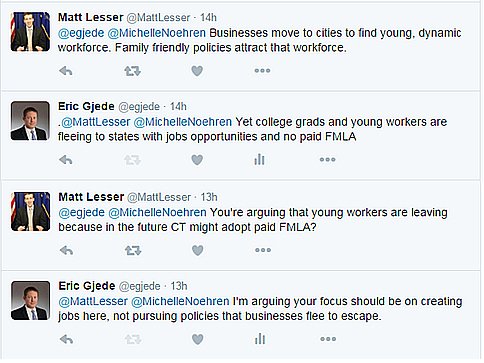Will Labor Mandates Be State’s Next Economic Test?

Losing a business to another state is never easy, but the hope is that lessons learned can help avoid a repeat.
As policymakers strategize ways to improve the state’s business climate, they have to consider what a long-time Connecticut company said prompted them to leave the state.

Borgeson said “enough was enough” to the perennial threat of new and expanded inflexible labor mandates—such as paid family and medical leave, mandated $15 per hour minimum wages, and paid sick leave.
Their plea was echoed in testimony last year from more than 36 organizations representing thousands of employers.
Some state lawmakers and advocates continue to push for those mandates, but they fail to see that it would make Connecticut businesses less competitive than all the other states that are saying “no, thanks” to such a program.
Voluntary vs. Mandatory
Some larger companies have influenced the debate, because they offer their employees generous paid leave policies. For that, they should be applauded.
But they’re doing it on a voluntary basis because they can afford to offer the benefit.
And overall, Connecticut is already heading in this direction.
What lawmakers are promoting is not voluntary, but another one-size-fits-all mandate. The costs to small businesses in particular will be significant.
What lawmakers are promoting, however, is not voluntary, but another one-size-fits-all mandate that would even apply to Connecticut's smallest businesses.
While employees would pay for the benefit through mandatory payroll deduction to the state, the costs to small businesses in particular would be significant—especially in the disruption to the workplace for potential six-week leaves, and in continuing to pay nonwage benefits for those not at work.
What’s more, taxpayers would be on the hook to pay for hundreds of additional state employees needed to administer the program.
Economic Boon?
Some say paid family and medical leave would boost the economy by attracting new workers. But if that were so, Connecticut—with numerous workplace mandates and more to be proposed—would be one of the top job markets in the country.

CBIA's Eric Gjede and State Representative Matt Lesser (D-Middletown) debated paid FMLA on Twitter.
States with fewer labor mandates, especially in the South and West, are growing in population while Connecticut continues to show a net loss.
New Jersey, which has a form of paid family and medical leave (although not exactly what Connecticut proposed), is also losing population.
The bottom line is our history of being a labor mandate friendly state has proven not to pay dividends in terms of attracting new businesses or talent to the state.
Rather than always relying on the stick, why not use carrots to encourage businesses to adopt new non-wage benefits by removing obstacles to success.
For more information, email or call CBIA’s Eric Gjede at 860.244.1931 | @egjede
RELATED
EXPLORE BY CATEGORY
Stay Connected with CBIA News Digests
The latest news and information delivered directly to your inbox.


